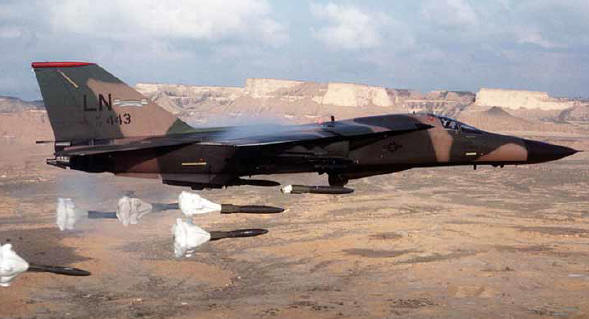|
|
| General
Dynamics F-111
Aardvark |
|

|
The F-111 was a multipurpose tactical fighter bomber
capable of supersonic speeds. It was one of the more
controversial aircraft ever built. In an attempt to reduce
development costs, Secretary of Defense Robert McNamara wanted
to procure only one airplane to be used by both the Air Force
and the Navy. The Air Force wanted a fast, long range
plane, but such a design was far too large and heavy for carrier
operations. Civilian DOD consultants came up with the idea
for a "Tactical Fighter Experimental" program, which
became known as the "TFX." As a compromise
between conflicting goals, the TFX was not ideally suited for
either. Although both services were against the plane, it was
"rammed down their throats."
The F-111 could operate from tree-top
level to altitudes above 60,000 feet. It had
variable-sweep wings that allowed the pilot to fly from slow
approach speeds to supersonic velocity at sea level and more
than twice the speed of sound at higher altitudes. Wings angle
from 16 degrees (full forward) to 72.5 degrees (full aft).
Full-forward wings gave the most surface area and maximum lift
for short takeoff and landing. The F-111 needed no drag chute or
reserve thrust to slow down after landing.
The Air Force aircraft was
produced in a variety of models. They had numerous
problems, and only the F-111F actually fulfilled the original
TFX design specification. This was not the fault of
General Dynamics, rather it was that of the civilian planners in
the Pentagon whose "cost effective" inclinations
ironically produced the major aeronautical fiasco of the
1960s. They set out to save money, but the plane ending up
cost far more than expected.
The F-111A first flew in December 1964.
The first operational aircraft was delivered in October 1967. A
models were used for tactical bombing in Southeast Asia. A
total of 563 planes were purchased Seventy-six were built as
FB-111s and saw service with the Strategic Air Command as
bombers until 1990 when they were converted to F-111Gs and
assigned to Tactical Air Command. The naval
aircraft, the F-111B, was never placed in
production. The last aircraft were withdrawn from
service in 1996.
|
|
|
|
|
